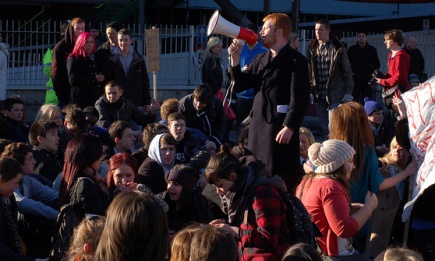Moocs: fooling the masses

In The Guardian Peter Scott (professor of higher education studies, Institute of Education) critically assesses the Mooc-phenomenon. “Moocs, for anyone who has switched off from the chattering of the policy/management class, are massive open online courses. The idea is that courses are uploaded to the “cloud” where they are available to everyone. The catch, of course, is that credentials – which is higher education’s core business – will remain as tightly rationed as ever.”
Professor Scott is of the opinion that Moocs will never amount to more than “fobbing off the masses”, while “government cuts, high fees, league-table snobbism all point to a reinforcement of elite forms of higher education.”
“Separating teaching from accreditation is an idea that appeals to some politicians, including David Willetts, the universities minister. He has suggested that students could study in one (lower-level) institution and be examined by another (high-status) one – which seems to come from the same stable as the idea that ‘top’ universities should set A-levels.”
Students being short-changed
It is also suggested that Moocs could relieve the teacher, as less face-to-face teaching would be needed in a world of Moocs. According to Scott this neatly fits in with the tendency of “looking for ways to increase ‘productivity’, which have been stubbornly resisted by students who already feel they are being short-changed. Now this new economy of learning can be sold as providing instant access to global ‘stars’ who are far better than our own run-of-the-mill lecturers.”
The proof of the pudding however, will be in the eating. Peter Scott doubts that there will be a workable business model for Mooc-education.
However, “high fees make the task of persuading (conning?) students more difficult, of course. And every decade since the 1970s we have been promised a Brave New World IT-powered revolution in higher education (remember the e-university?). So don’t hold your breath.”
Uncertainty at the heart
The reason it won’t work, says Professor Scott, is a philosophical one: “The answer seems to be that at the heart of the best teaching is an irreducible uncertainty. Like Socrates, all we really know is that we do not know. Or, following Karl Popper, the most we can hope for is provisional knowledge that has not yet been falsified. As a result, the best teaching has to be communal and reflexive, to allow for permanent dialogue.”
Peter Scott thinks that the Mooc-debate should be put into a wider context. The topic demands a fundamental debate about combining teaching as a permanent dialogue and teaching expert skills. “How can we keep the curriculum open in increasingly industrialised ‘learning environments’ and ‘managed’ institutions?”
Meest Gelezen
Vrouwen houden universiteit draaiende, maar krijgen daarvoor geen waardering
Hbo-docent wil wel rolmodel zijn, maar niet eigen moreel kompas opdringen
‘Sluijsmans et al. slaan de plank volledig mis’
Wederom intimidatie van journalisten door universiteit, nu in Delft
‘Free riding brengt het hoger onderwijs in de problemen’


